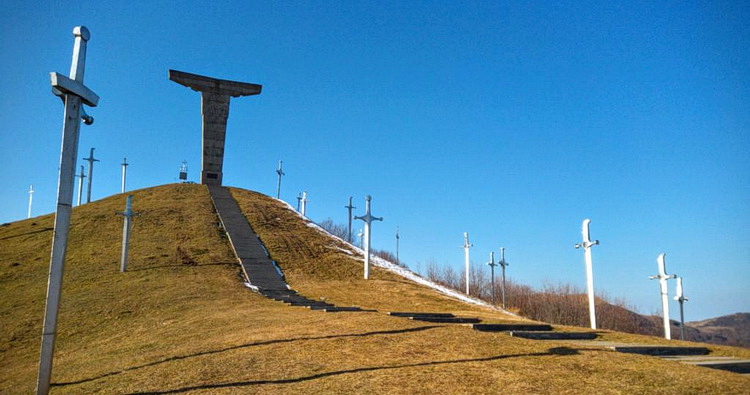Georgia marks 900th anniversary of Didgori Battle

A memorial monument to the Battle of Didgori, where celebrations of the anniversaries are often held. Photo via Georgian Travel Guide.
Georgian state institutions, artist shows and a wider public are celebrating the 900th anniversary of the Battle of Didgori, a pivotal moment in the history of the medieval Kingdom of Georgia and the Great Seljuq Empire.
The date is customarily marked in the celebration of 'Didgoroba' on August 12, in the Didgori Valley - about 40 km to the west of capital Tbilisi - where the 1121 battle involving between 130,000 and 650,000 combatants in total took place.
This year's events paying homage to the event include a theatrical reenactment of scenes of the battle, a contest for patriotic poems around the subject, and a competition for a feature-length fiction film on the topic, announced by the culture ministry.
The date also saw comments from Georgian officials, with Prime Minister Irakli Garibashvili calling the battle one of the "most impressive" victories in world history.
The battle "teaches us that any challenge can be overcome through unity", said Garibashvili, who is scheduled to award soldiers with a medal specially designed for the anniversary later today.
President Salome Zurabishvili also paid a homage to the historical event, while also telling citizens the celebrations should not be limited to the past and calling the nationwide efforts against the Covid-19 pandemic "the Didgori of today". The president said in her address the battle against the virus "is a victory that needs to be won by us, even if it does not take place on a battlefield".
Seen as a historic moment for the 12th century Caucasian kingdom and a shock win over a numerically superior Muslim forces (as reported in Christian historical sources), the Didgori victory is also viewed as an illustration of military acumen of Georgian rulers and a major pillar in patriotic narratives in the Georgian society.
In the battle, the Seljuk army was defeated through what is described in sources as effective military tactics of King David IV - also known as David the Builder and considered as one of the most successful monarchs of Georgia from the Bagrationi dynasty.
The win is credited to an effective use of terrain by the defending Georgian forces, combined with a lack of manoeuvring opportunity in a constrained location for the invading forces of Najm ad-Din Ilghazi ibn Artuq.
Historical sources offer a wide variation of involved numbers, especially on the Seljuk side. The Georgian and wider Christian sources indicate anywhere between 100,000-600,000 troops from the invading army, while the Arab historical records point to 30,000 combatants in the Ilghazi army.
Georgian historian Mikheil Bakhtadze told Radio Free Europe/Radio Liberty's Georgian service he believed a force of 70,000-75,000 could have been the upper ceiling of the Seljuk capacity for mobilisation.
The Georgian forces are said to have involved around 55,000 troops including 40,000 Georgians, 15,000 Polovtsians and Kipchaks, 500 Alans, 100-500 Frank knights and other forces.
Baktadze also said in his comments about the battle the "genius" of King David IV's military approach had been illustrated by his successful forcing of the intruders led by the experienced Ilghazi - who had defeated Crusader armies before - to accept the clash in an unfavourable terrain.
The victory in the three-hour battle led to a major change in political influence in the Caucasus - which shifted away from Muslim leaders - and the unification of the Georgian kingdom in the year following the battle.
 Tweet
Tweet  Share
Share